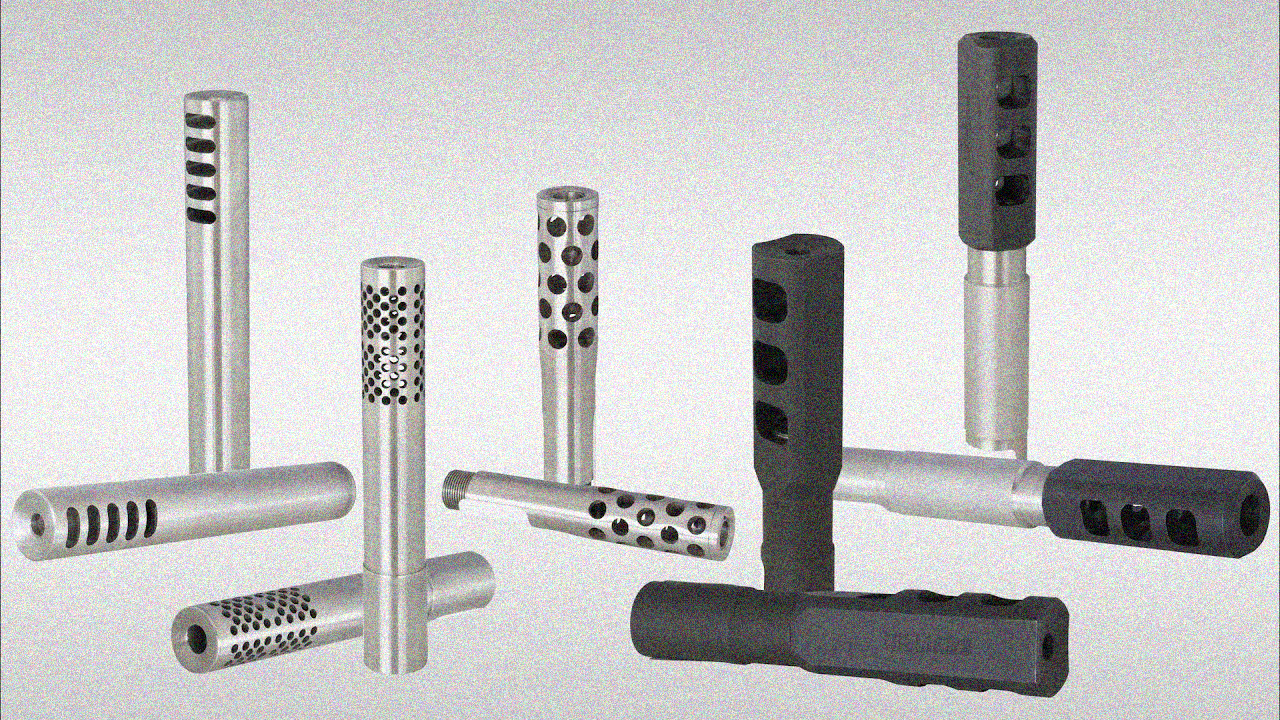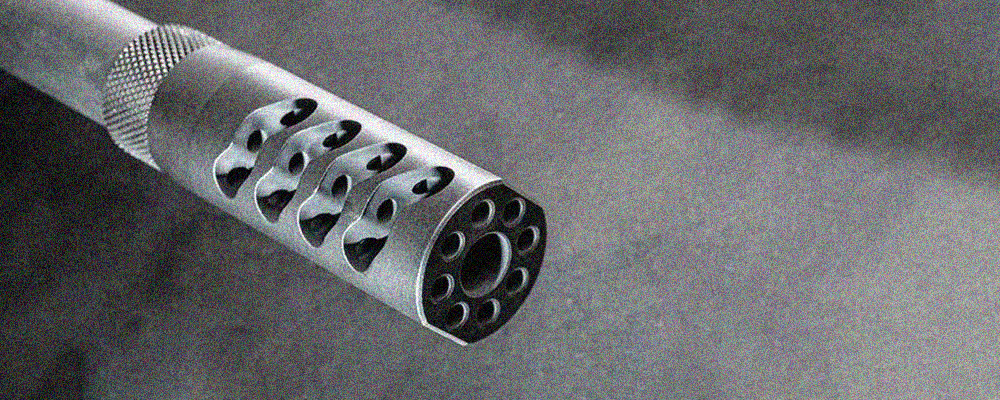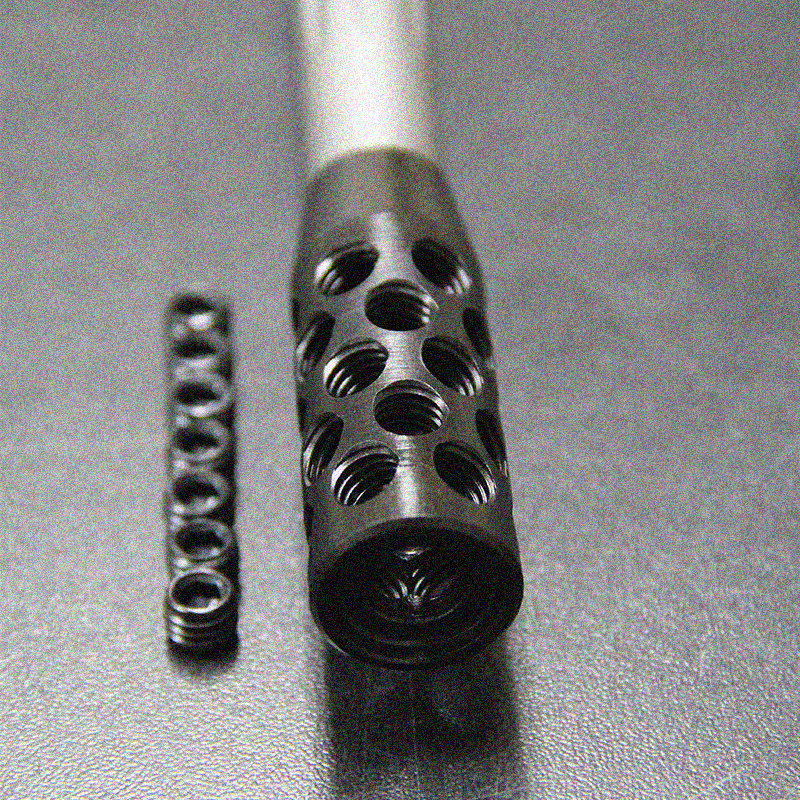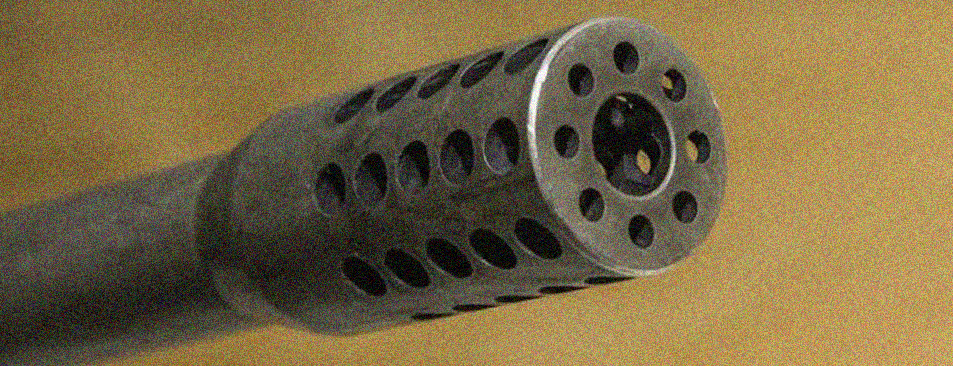Muzzle brakes are commonly used on high-powered rifles to reduce felt recoil, and they can also be used to slightly increase accuracy. Muzzle brakes work by redirecting some of the gases that escape from the barrel when a bullet is fired, and this can help to counterbalance the effects of recoil.
There are a few different types of muzzle brakes, and each type can affect accuracy in slightly different ways.
- Ported muzzle brakes have small holes drilled into them, and these holes allow some of the gas to escape outwards. This helps to reduce both felt recoil and muzzle rise, but it can also increase noise and lead loss.
- Slotted or vented muzzle brakes have larger openings that allow more gas to escape, and this can lead to a more noticeable reduction in recoil. However, it can also cause more muzzle blast and noise.
Both ported and slotted muzzle brakes can be effective at reducing felt recoil, but they each have their advantages and disadvantages. If you’re looking for the best possible reduction in recoil, a ported muzzle brake might be the better option. However, if you’re worried about noise and lead loss, a slotted or vented muzzle brake might be a better choice. Ultimately, the best type of muzzle brake for you will depend on your individual needs and preferences.
There’s a lot to unpack here when it comes to muzzle brakes and their effect on accuracy.
Let’s start with the basics: what exactly is a muzzle brake?
Modeled after early car mufflers, muzzle brakes are attachment devices meant to redirect powder gases exiting the muzzle to decrease recoil. By reducing rearward-facing pressure and directing it more forward, shoulder fatigue is reduced, and follow-up shots can be generated more quickly. Although prefixed or integral brakes are available on some factory rifles, most shooters choose an aftermarket option so they can tailor the performance of their device to specific ammunition loads.
Now that we know what they are, let’s ta a look at how muzzle brakes work.
There are two main types of muzzle brakes:
- Ported. Ported brakes have small holes drilled into the top and sides of the device so that when the round is fired and gases exit the muzzle, they are redirected to the side and up. This action effectively counters recoil by negating some of the rearward pressure.
- Non-ported. Non-ported brakes, on the other hand, rely on a series of baffles to achieve the same effect. These baffles work to redirect gases upward so that less pressure is exerted on the rear of the firearm.
So, which type of brake is best for accuracy?
That depends on several factors, including ammunition type, barrel length, and the shooter’s shooting style. For example, if you’re shooting a short-barreled rifle (SBR) with a suppressor attached, a ported muzzle brake is likely going to be your best bet. The added length of the suppressor can cause turbulence in the gases exiting the muzzle, which can negatively impact accuracy. Ported brakes help to counteract this by redirecting those gases before they have a chance to disrupt the trajectory of the bullet.
On the other hand, if you’re shooting a long-range rifle with traditional stock and no suppressor, a non-ported brake might be a better choice. The lack of ports means there’s less risk of gas blowback, and that can lead to cleaner shots and less muzzle rise.
Ultimately, the decision of which type of muzzle brake to use comes down to personal preference and the specific needs of your rifle setup. If you’re not sure which one is right for you, talk to a qualified gunsmith or firearms instructor. They can help you determine which type of brake will work best with your particular rifle and ammunition combination.
A muzzle brake is a device that’s attached to the muzzle of a firearm to redirect propellant gasses to counter recoil. While they don’t increase accuracy, they can help reduce felt recoil, which can make it easier for a shooter to stay on target and keep their shots tight groupings.
There are some downsides to muzzle brakes though. They can be loud, so if you’re shooting next to someone else, they’re not going to be too thrilled about it. They also kick up a lot of dust and debris when firing, so if you’re shooting prone or from cover, that can be an issue.
Overall though, muzzle brakes can be beneficial for shooters who are looking to stay on target and keep their shots tight.
If you’re asking whether a muzzle brake affects the accuracy of a firearm, the answer is yes and no.
A muzzle brake will redirect some of the gases that exit the barrel upon firing, and this can result in less felt recoil and muzzle rise. This can make it easier to stay on target during rapid-fire, but it can also cause the firearm to become slightly less stable (due to the muzzle’s movement), which may result in reduced accuracy.
Ultimately, it comes down to individual preference and what works best for you. Some shooters find that a muzzle brake helps them shoot more accurately, while others find that it has no effect or even reduces their accuracy. If you’re looking to add a muzzle brake to your firearm, we recommend trying it out at the range to see if it’s something that works for you.
We also recommend that you watch this video

There are a few factors that can affect muzzle brake accuracy:
- One is the additional weight at the end of the barrel which can cause the gun to be front-heavy and difficult to control during rapid fire.
- Another factor is the design of the muzzle brake itself. Some designs direct more gas and noise away from the shooter, while others blast more debris back towards them. Some brakes are even known to cause harmonic vibrations that can disturb bullet trajectory.
Ultimately, it depends on the individual gun and muzzle brake combination as to whether or not accuracy is affected.
Muzzle brakes are devices that are attached to the muzzle of a gun (typically a rifle) to redirect propulsive gasses and relieve muzzle rise. There is some debate as to whether or not muzzle brakes affect accuracy, with some experts claiming that they improve accuracy while others insist that they degrade it.
That being said, there is evidence to suggest that muzzle brakes can Affect firing precision. A 2014 study published in the Journal of the Mechanical Behavior of Biomedical Materials found that muzzle brakes can generate “significant levels of directional vibration” that could cause a loss in firing precision.
Muzzle brakes affect accuracy in several ways. By redirecting the gases that exit the muzzle, they can increase the gun’s stability and reduce felt recoil. This can help the shooter to keep the gun on target, especially during rapid fire. Additionally, muzzle brakes can produce Flash Suppression by harnessing and redirecting some of those same gases. By reducing or dispersing the muzzle flash, it becomes easier for the shooter to spot their shots and make corrections accordingly.
There are a few downsides to muzzle brakes, however.
First, they tend to be loud – often painfully so for anyone standing nearby.
Second, they can add significant length to a gun’s barrels which may not be ideal in all situations.
Third, they can create a lot of dust and debris when used on dirt or gravel ranges which can be irritating (and even dangerous) to shooters and bystanders alike.
Please login or Register to submit your answer




